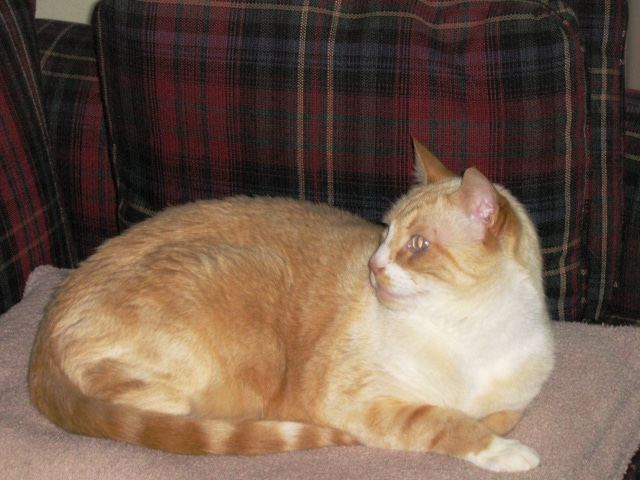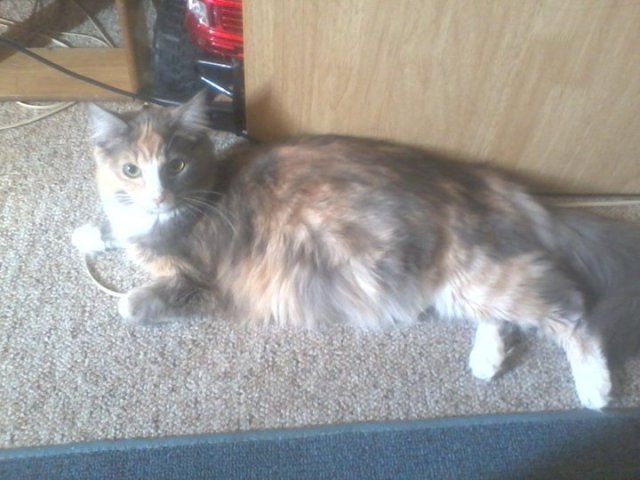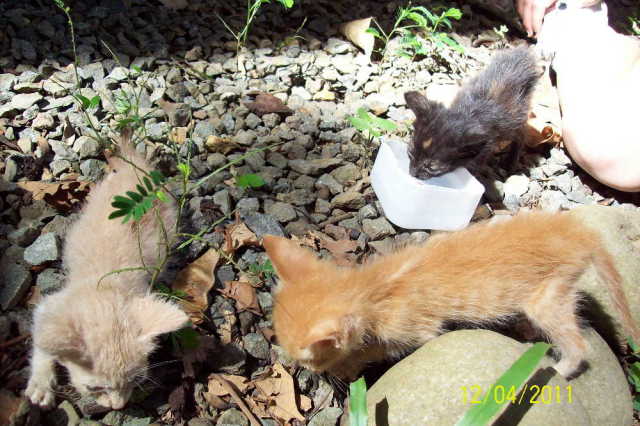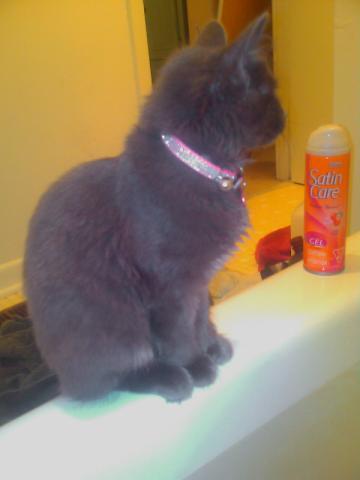QuestionMy kitten was born in September and I received her in November. When I 1st got her I took her to the vet because she had an eye infection when she was given an antibiotic and some eye ointment. About 3 months ago the kitten began pulling her hair out in big clumps. She has been doing this everyday since. I took her to the vet on 3 different occasions for this and the 1st time he gave her a cortisone shot and said that it was allergies. The last time he gave her herbal anxiety meds. Now the kitten has the entire part of her bottom neck infected with sore that she had dug in. The vet has no clue what to do for my kitten but to put her on valium or put her to sleep. Please help!
AnswerHi Candice,
I'm so sorry to hear about your troubles with your kitten! Certainly, whenever we see a cat that's in apparent distress, and there's no obvious reason, it naturally bothers us. I can see where this situation is no different.
I have to say that it sounds like your vet has followed routine treatment regimens for something like this. When a cat is pulling out their hair in clumps, it's frequently an allergy of some sort. However, the difficult part is finding out what is causing the allergy, and that can be a monumental task!!
When we think of allergies in cats, the first thing vets (and most owners) think of is a food allergy. Certainly if you've changed or eliminated other things in the cat's environment, and the behavior continues, then it's natural to lean towards a food allergy, especially if you haven't changed the diet in any way. Frequently, grains are the culprit in food allergies, as cats digestive systems are not made or designed to ingest grains. Cats can't digest them, and as such, have no need for them. Grains are almost always found in cat food, and because cats are exposed to grains so frequently, that repetitive exposure can cause an allergy. Same with any type of protein source that you feed your cat regularly, such as chicken (the most common allergen in cats), turkey, beef, etc. I think it would be worthwhile, if you haven't done so already, to do an elimination diet (with the okay of your vet, of course). This is eliminating certain things from the cat's diet for several wks--usually a month or more--in an effort to see if eliminating the protein, or grain, or whatever it is, helps decrease or stop the behavior. Here's the bad news, though---you have to have extreme patience with this elimination diet because changes don't happen overnight, and can take weeks before you see a difference. AND, if you're eliminating a protein source, you need to add another protein source in to replace whatever protein source you're eliminating. For instance, if you eliminate chicken, you need to replace it with beef or turkey so that there's still a protein source. However, I think before you move to eliminating a protein source, it would be more helpful to eliminate all grains if you're feeding food with grains in it. You need to look at ALL the food you feed your kitten, including treats, and see if there's any grain in any of it. This would include corn, corn gluten, wheat, wheat gluten, rice, bran, etc. And again, almost every single cat food out there has some sort of grain in it unless it specifies it's grain free--but even then, I've still caught some brands with rice on the label!
There are plenty of better quality cat/kitten foods that are grain free. I would stay away from any food sold in the grocery stores or Petco or Petsmart. Go to an independent retailer, and look for Merrick's BG (before grain), Nature's Variety, Wellness Grain Free, Natural Balance, etc. It usually says on the label "grain free", but still read the label thoroughly and carefully. Having studied feline nutrition, I feel strongly that the best diet for your cats/kittens is raw, then canned, then kibble. There is no good quality kibble, no matter how you spin it, so if your kitten is at least eating canned, I'd keep her on canned vs kibble. You're also more likely to come across canned products that are grain free more easily and readily than you will kibble.
If your vet is okay with you eliminating grain from her diet, you need to do it at least for 4 wks. If it turns out that grain is what she is causing her problem, then you may see a noticeable difference almost immediately; or it could take a little longer. But it can take some time for the grain break down products to be completely removed from the cat's system, hence the reason you want to do an elimination diet for several wks. It's also a good idea to keep a food diary, so if there are changes, good or bad, you can note them and have that for reference down the road, so you know what triggers the pulling out of fur, or what stops it, what products she may do better or worse with, etc.
If it's been several wks, and you haven't noticed a difference, then the next step would be to eliminate the protein source (again, with your vet's permission). At that point, you need to look at what you're feeding her, and see how many different sources of protein you're feeding her. Is it just chicken? Just turkey? Chicken most days, turkey only 1-2 days? Whatever your primary protein source is is what you want to eliminate. You'd go about it the same way as eliminating grain---stop everything that contains the protein source you're eliminating (treats included) and only give her beef or turkey, but keep the # of protein sources down to a minimum, because if there happens to be more than one protein source triggering an allergy, you want to be able to document what you fed and what happened. For instance, if the kitten has been off chikcen for 2 wks, and you're feeding her a few different types of canned food, some seafood, some beef, some turkey. You give her different cans of beef cat food for a couple of days, and then you notice she starts pulling out her hair again. You should be documenting what you're feeding her everyday, so at this point, you can refer back to your food diary, and see what you've fed her the last couple of days, and that should help you pinpoint that maybe she's also got an allergy to beef, OR, maybe the true allergy is beef.
Hopefully that makes sense. Just remember that it takes time, and you have to have patience. You can't get frustrated and give up the elimination diet after a wk, because I've seen these diets take 4+ wks. So, just stick with it until you either notice a change, or notice no change at all. Don't feed her a lot of different brands and varieties of flavors during this time, because again, if something does happen and she either gets worse, or flares up, you need to be able to tell what caused it, and if you've fed her a ton of different brands and flavors in a couple of days, it's going to be difficult to tell what caused her condition to flare up. And just because you're giving the same flavor of something, but different brands, doesn't mean she's getting the same thing. Nutrients, ingredients, calories, etc can vary greatly from company to company, so again--very important to limit what you feed her during this diet.
Now, on to other causes for her behavior. It's very possible that your kitten does have anxiety, and this is how it's manifesting. Some kittens are born anxious, or they devolop anxiety from their mom or peers, or even their owners and the environment. Cats can sense emotions extremely well, and if they sense their owner constantly anxious or angry, or sad, they can very well develop those same emotions and they manifest in the form of destructive behavior. So, it may be worth it to look at the environment--is there anything that could be causing her to have strong emotions? A dog? A cold area that she has to sleep in or eat in or go to the bathroom in? Are you constantly upset in some way? Are there many people coming and going all the time? Do you play with her enough? How do you discipline her--do you yell at her, or swat her, or shoo her away? Any and all of these things can cause a cat to become upset and start "acting out" in the form of self destructive behavior, like pulling their hair out. My cat licks obsessively, and I've learned that she's a VERY anxious kitty, and worries a lot--just like her mom.
I think your vet could have offered you more choices for solutions rather than being black and white and saying valium or euthanized. Of course, you make the final ultimate decision what you want to do, but there are other options out there. I would do everything possible before putting a cat on valium. Long term valium use can be dangerous in cats, and can actually cause death. Cats who take oral valium for more than a wk are at risk for liver failure. The cats that develop liver failure are frequently cats who had no prior history of liver problems either. Valium can also cause aggression or overexcitement. And some cats just literally become jello on it. I lost the love of my life in June, my Himalayan, and I had given her tiny, tiny doses of valium (1/8 of a pill!) for arthritic pain (she was almost 18) and as an appetite stimulant, and she became so flaccid that I HAD to stay home with her until the drug ran its course. It was too dangerous for her to be alone. She couldn't stand, she couldn't walk, she couldn't hold her head up, she couldn't eat or drink on her own, and my great fear was that she would attempt to jump up on something, and fall, or jump down from something, and fall, and because she had no control over her muscles (it is a muscle relaxant after all), she would seriously hurt herself by fracturing a bone. Finally, if a cat is on valium for more than a wk, it must be slowly tapered off the dose, because stopping it suddenly can precipitate seizures. Therefore, I would only want to use valium as an absolute last resort.
One recommendation I would have is acupuncture. Acupuncture has been found to be extremely safe and effective in cats for a variety of ailments. You need to make a commitment to it, as it's usually done 1-2x/wk for 4-8 wks, depending on the condition. But that would be my first choice recommendation. If it doesn't help, it certainly has done no harm, and it may help your kitten with other issues that you're either aware of (like the sores on her neck and pulling out her hair), or haven't been made aware of yet.
There's also kitty prozac, although I'm not sure off the top of my head if it's safe for use in kittens. But I do know that it's used in adult cats for behavioral problems and there's been pretty good success with it. I would try this over valium.
You could also just start off the old fashioned way--by evaluating her environment and she if there's anything that sets her off. Before she starts pulling her hair out, is there something you notice that starts it? A loud noise? Are you yelling at her or something or someone else? Do you have other pets that maybe initiate play and she's sleeping? Has she just eaten? Try and see if there's a pattern to when you notice her doing the behavior. If there is, and you figure it out, then you can work on eliminating the source of the problem. I also would discourage her from doing it when you catch her, but obviously, if you're not home 24/7, it's hard to be consistent in getting her to stop when you can't be there all day to police it. However, I'd still tell her to stop when you notice it. I do that with my cat and her licking and biting. Whenever I notice it, I immediately make a "tsst" sound very loudly. Cats don't like that sound, and will stop, and it's been shown to stop bad behavior because they dislike it so much.
Most importantly, the sores on her neck need to be treated, especially if they're open and oozing. That is just a portal for infection, so you want to and need to treat that with antibx or an antibx cream. Has she been tested for a fungal infection? Ringworm? How about mange? Fleas? Even though you may not see fleas, doesn't mean she doesn't have them. They can hide them pretty well in the early stages of infestation. Barring any infectious disease process, then I think you're likely looking at either a behavioral issue, or an allergy. If it's an allergy, once that's determined, there are antihistamines and other meds that you can put her on to treat this--and there's also steroids, which would keep inflammation down and prevent a flare. Acupuncture would also work well to prevent this from happening again. If behavioral, it's likely a neurotic licking she has, and just like I said previously, assessing her environment and trying to determine what is setting it off will be key in treating her and getting rid of it completely.
You likely have a tough task ahead of you. However, once you determine what's causing her to pull her hair. out, you can actively work to fix it permanently. Regardless of what's causing her behavior, it will take time to find the cause, and then treat it. So you must not give up or throw your hands up in frustration yet. Speak to your vet again, and see if he'd be willing to work with you on any of the suggestions I've made. Another one I just thought of is an E-collar. If your cat has open sores on her neck, you may want to put her in one of these collars because that will keep her from making the sores worse, and prevent her from pulling out her hair anymore.
I know this is a long response, but I hope you get something out of it, and can use some of what I'm telling you. If you have any other questions, feel free to post again. I will do whatever I can to help you out. I wish you the best of luck--and remember--PATIENCE!!
Savannah

 Cant get cat to play
Question
Jules
My male cat Jules is 13. La
Cant get cat to play
Question
Jules
My male cat Jules is 13. La
 wonderin??
Question
CIara
Hi Karen,
This is my first time dealing
wonderin??
Question
CIara
Hi Karen,
This is my first time dealing
 Orphaned baby kittens in the rainforest
Question
kittens
Hello,
My wife and I are volunteers in
Orphaned baby kittens in the rainforest
Question
kittens
Hello,
My wife and I are volunteers in
 my pregnant cat has given birth to one dead kitten
Question
l
my cat has been nesting for last 2 days, whe
my pregnant cat has given birth to one dead kitten
Question
l
my cat has been nesting for last 2 days, whe
 urgent cat problem
Question
kitty aka chanel
my cat is about 7 mont
urgent cat problem
Question
kitty aka chanel
my cat is about 7 mont